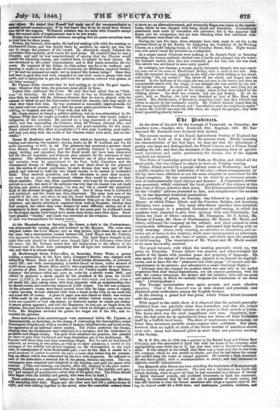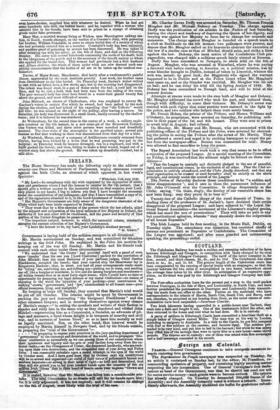• Zbe 113robincts.
At the close of the poll for the borough of Yarmouth, on Saturday, the numbers were—Sanders, 414; Rumbold, 384; Bagshaw, 300. Mr. San- ders and Mr. Rumbold were declared duly elected.
The annual meeting of the Royal Agricultural Society of England has been held at York on four days of the present week. Briefly summing the characteristics of the four days, we may say that the attendance of gentry was large and distinguished, the Prince Consort and a Prince Royal heading the list; and that the character of the competing show of agricul- tural inventions and cattle, particularly the former, was of the highest standard yet attained.
The Duke of Cambridge arrived at York on Monday, and visited all the show-yards, but was obliged to return to town on Tuesday evening. Prince Albert arrived by a special railway train on Wednesday; and had a public reception by the authorities of the city,—whose arrangements, by theby, have been criticized as not the most complete or convenient for the Royal reception. He was conducted to his hotel by an immense proces- sion of enthusiastically loyal citizens anji. farmers.- A Corporation address was presented,- which expressed the loyal gratitude of the citizens at this first visit of Prince Albert to their town. The Prince returned brief thanks for the "dutiful" address presented to him, and complimented the ancient city on her important historical associations.
The awarding of prizes, on Tuesday, was followed by a grand pnblid dinner; at which Prince Albert, and the Prussian, Belgian, and American. Ministers, were present. The usual after-dinner speeches were curtailed, in order to engage in a practical discussion on calf-rearing, in which the speakers were expected to give their opinions fully and didactically, but within the Emit of fifteen minutes. Mr. Thompson, Sir T. Sykes, Mr. Turner of Exeter, Mr. Shaw of Northampton, Mr. Barnet, Mr. Mechi, and others, addressed the company on the subject; and there seemed to exist, considerable difference of opinion. Some advocated high feeding with an early weaning; others, early weaning, an attention to cleanliness, and ex- ercise out of doors in fine weather while some recommended an adherence, as nearly as possible, to the laws of nature, and dwelt upon the analogies of child-rearing. The observations of Mr. Turner and Mr. Mecbi seemed to be most favourably received.
The grand banquet, with which the meeting generally winds- up, *sr' given on Thursday. Prince Albert was present,. and acknowledged tbe health of the Queen with peculiar grace and propriety of language.. He, also spoke of the object of the meeting; claimed to be himself an argriozi. twist, and to have felt the" pleasures and little pangs" of success and die.- appointment in its pursuit; and adventured a small rhetorical flight— "Although time has changed the position which was once held by the landed, proprietors with their feudal dependencies, yet the country gentleman, with his: wife, the country clergyman, the farmer, and the labourer, form still one great and united family, in which we cordially recognize the foundations of our social. state." (Greatapplanse.) The Foreign Ambassadors were again present, and made effective speeches. That of Mr. Bancroft was at once elegant and practical, and • produced great enthusiasm among the English farmers.
In the evening a grand ball was given, which Prince Albert honoured. with his presence.
With regard to the cattle-show, it is observed that the animals generally exhibited. were less painfully obese than heretofore, and that the judges have tacitly respected public opinion on the point in their awards of prizes. The horse-show was the most magnificent ever seen. Singularly, how ever, the first prize for an agricultural horse was borne off from Yorkshire itself by a Sullblk-bred horse. The show of implements was immense: no fewer than seventeen portable steam-engines were exhibited. Not more, however, than an eighth or ninth of the whole number of machines shown were new: many had obtained prizes at more than one previous meeting of the Society.
Mr. R. R. Dix, who in 1846 was a partner in the Bristol Lead and Patent Shot Company, and who absconded in April last with the books of the company, after appropriating 90010 debts due to it, has just been tried at Bristol for embezzle- ment. It was alleged on his behalf, that there was a large sum due to him from the company, which he was unable to obtain; and that he had taken the money and carried away the books to compel payment. He received a high character. He was found guilty, with a recommendation to mercy; and was sentenced to eighteen months' imprisonment.
One Muscroft alias Roscoe has been swindling the tradesmen of Knaresborongh and its vicinity with great audacity. The man was a labourer on the Leeds and. Thirsk Railway, when he gave out that he had succeeded to a fortune of twenty or thirty thousand pounds, and produced documents to back the statement. Statibg to tradesmen that he was not yet in possession of ready money, but was still desirous to treat his former associates and adopt a superior style of liv- ing, he desired credit for a little time; and innkeepers, jewellers, clothiers, and
even horse-dealers, supplied him with whatever he desired. When he had got some hundreds into debt, the bubble burst; and he, together with a woman who assisted him in his frauds, have been sent to prison on a charge of obtaining goods under false pretences.
Mary May, a married woman living at Wickes, near Manningtree railway !da- tion, in Essex, stands charged, on the verdict of a Coroner's Jury, with poisoning her brother, William Constable, in order to obtain burial-fees of a society of which she had privately entered him as a member. Constable's body has been exhumed, and positive proof of poisoning by arsenic has been discovered. He was taken ill after drinking tea with his sister, on the 8th of June, and died on the following Sunday. His sister told several falsehoods concerning the mode of his death, both to the clergyman of the parish and to the secretary of the benefit society to whom she applied for the burial-fees. This woman had previously lost a first husband and fifteen children, the whole of them under what are now deemed such sus- picious circumstances that the bodies of all are to be taken up for medical exa- mination.
Davies, of Major Street, Manchester, died lately after a twelvemonth's painful illness, aggravated by the most destitute poverty. Last week, his brother came from Shrewsbury to see him buried. On 1 hursday week, Davies's widow retired to rest with an infant born a few weeks ago but in the morning had disappeared. The infant was found dead, in a pan of water under the bed; a card laid on the floor, and by its side a hook that had been torn from the ceiling of the room. The poor woman's body has since been found in a water-butt placed twenty feet above the ground, and most difficult of access.
John Mulcock, an elector of Cheltenham, who was employed to convey Mr. Gardner's voters in certain flies which he owned, had been pelted by the mob dnring the election, and had talked of his expecting that "the Yellows" would UM 'him: he was missed on the night of the polling, after leaving a tavern. On Saturday, his body was discovered in a small brook, hardly covered by the shallow water; and it is believed he was murdered.
At Wednesbnry, for the second time in the course of a week, a colliery explo sion occurred on the 6th instant, in a new mine-pit of the Brunswick Colliery One Vernon was killed, and three other persons were scorched and dreadfully maimed. The close state of the atmosphere is the ascribed cause: several pits became so foul that working in them was discontinued from that day for a time.
At Woolwich, Moore, one of a company of Artillerymen recently returned from Ceylon, having been kicked by a horse that he was grooming, was put in the hospital: on Thursday week he became deranged, ran to a cupboard, and with a knife gashed his throat; and then, failing to make a fatal wound, leaped out of a window sixty feet above the ground. He was taken up dreadfully crashed, but is still alive.



























 Previous page
Previous page